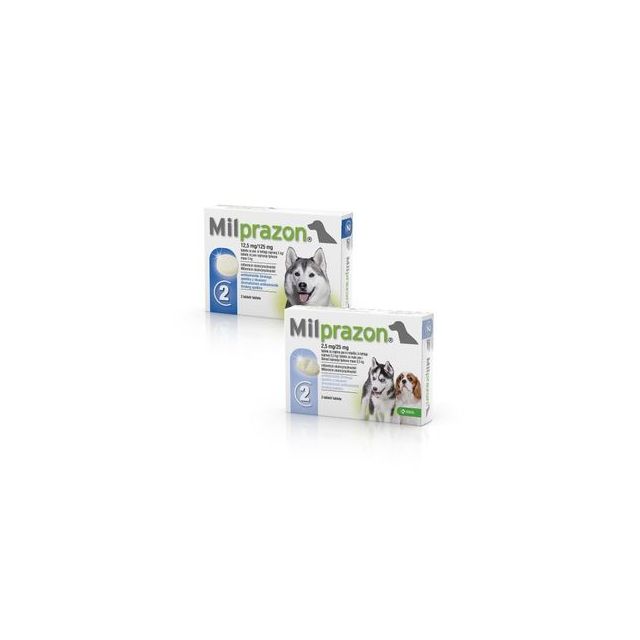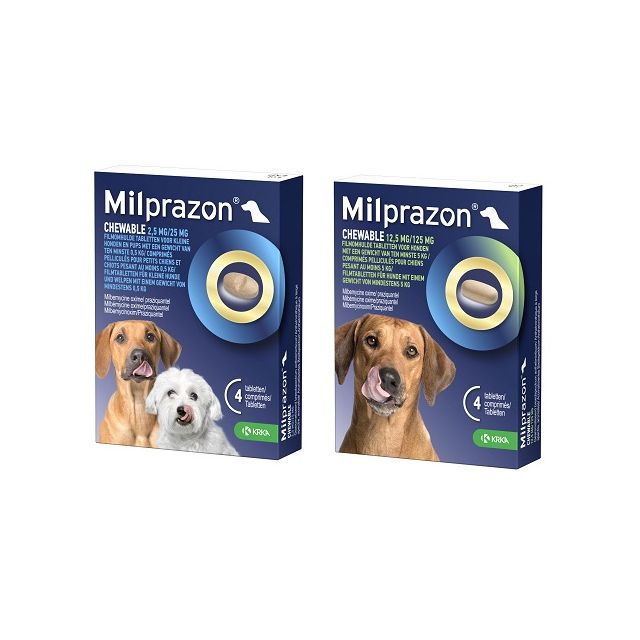Milprazon - Rabbit - Dog - Tablets
Milprazon is a safe and effective deworming treatment for dogs and cats. It treats the most common worm infections and is easy to administer thanks to the palatable tablets and even tastier chewables. Depending on the weight, you can choose from different Milprazon products. For dogs, there are Milprazon dog tablets and Milprazon Chewables for dogs. Cat owners can choose Milprazon cat tablets or Milprazon Chewables for cats.
Active ingredients
Milprazon contains Milbemycin oxime and Praziquantel as active ingredients. Milbemycin oxime targets worm infections such as roundworms, hookworms, and whipworms, and provides protection against heartworm. Praziquantel eliminates tapeworms, including the fox tapeworm (Echinococcus).
The importance of deworming
Dogs and cats can contract worm infections that may cause health issues such as diarrhea, vomiting, coughing, growth delays in young animals, decreased energy, and weight loss. Some worms also pose a risk to humans. To minimize these risks, it’s important to regularly deworm your pet or perform fecal tests.
Administration of Milprazon
Milprazon tablets and chewables are administered orally, with or after food. The tablets for small dogs and cats are divisible for precise dosing.
Milprazon dosage for dogs
|
Weight |
Milprazon for small dogs and puppies |
Milprazon for dogs |
|
0.5 – 1 kg |
½ tablet or chewable |
|
|
1 – 5 kg |
1 tablet or chewable |
|
|
5 – 10 kg |
2 tablets or chewables |
|
|
10 – 25 kg |
1 tablet or chewable |
|
|
25 – 50 kg |
2 tablets or chewables |
|
|
50 – 75 kg |
3 tablets or chewables |
Milprazon dosage for cats
|
Weight |
Milprazon for small cats and kittens |
Milprazon for cats |
|
0.5 – 1 kg |
½ tablet or chewable |
|
|
1 – 2 kg |
1 tablet or chewable |
|
|
2 – 4 kg |
½ tablet or chewable |
|
|
4 – 8 kg |
1 tablet or chewable |
|
|
8 – 12 kg |
1½ tablet or chewable |
Deworming schedule
The recommended deworming schedule varies per animal and depends on environment and lifestyle. Ask your vet for advice. General advice:
- Deworming adult dogs and adult cats: on average 4 times per year. Pets that eat raw meat or hunt may need more frequent deworming. If you live in or travel to an area where heartworm is present, more frequent deworming is also advised.
- Deworming puppies: at 2, 4, 6, and 8 weeks of age, then monthly until they are 6 months old.
- Deworming kittens: start at 3 weeks of age, then every 2 weeks until 2 weeks after weaning. After that, monthly until they are 6 months old.
Other medications and supplements alongside Milprazon
Worms are internal parasites. Dogs and cats also suffer from external parasites like fleas, ticks, mites, and sandflies. Some tapeworms even use fleas as intermediate hosts, so flea and worm infestations often occur together. A good flea product such as Advantage or Adtab can help keep your dog or cat free of these pests. We are happy to tell you more about protecting your dog from fleas and other bugs and protecting your cat from fleas and insects.
Often, a worm infection causes no symptoms. But it can sometimes lead to diarrhea or other digestive issues such as vomiting. In addition to deworming with Milprazon, you can support your dog’s or cat’s gut with probiotics like Protexin Pro-Kolin Advanced, Purina Pro Plan FortiFlora Dog or Purina Pro Plan FortiFlora Cat. Water-binding psyllium fibers in Iso-Gel help firm up the stool.
If you have a question about Milprazon or deworming your dog or cat, please contact us.



